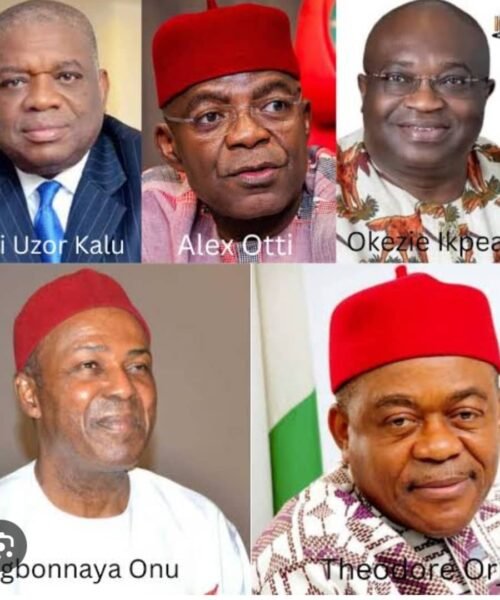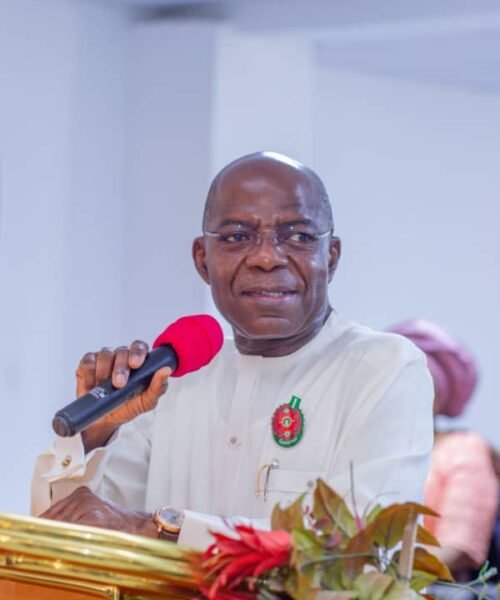Restoring Financial Prudence: Governor Otti’s Quiet Revolution in Abia’s Finances
By Ebere Uzoukwa, PhD
When Dr. Alex Chioma Otti assumed office as Governor of Abia State in May 2023, he did not just inherit the paraphernalia of government—he inherited a state grappling with deep financial instability. With a domestic debt stock of ₦138 billion, a bloated and fraudulent payroll system, and a legacy of unchecked fiscal recklessness, the economic condition of Abia was dire. Many believed that only an emergency intervention—most likely involving heavy borrowing—could prevent the state from economic collapse.
Contrary to expectations, Governor Otti did not resort to populist quick fixes or dramatic bailouts. Instead, he initiated a quiet but radical revolution—a deliberate, disciplined, and transparent approach to public finance that has today placed Abia at the forefront of fiscal responsibility in Nigeria. His method was not built on noise or public grandstanding, but on the firm foundation of prudence, strategic reform, and long-term planning.
The results of this approach have been nothing short of transformative. According to the March 2025 report by the Debt Management Office (DMO), Abia State recorded a 57.2% reduction in its domestic debt profile within just one year—between March 2024 and March 2025. This performance positioned Abia as the number one state in Nigeria in terms of debt reduction. From ₦138 billion in May 2023, the debt burden was slashed to ₦66 billion by the end of 2024. This was achieved without adding a single naira in new borrowing.

Speaking during the second quarter 2025 Executive Strategy Retreat, Governor Otti highlighted the thinking behind his administration’s fiscal strategy: “We have already paid down ₦72 billion of inherited debt and added not one kobo in fresh borrowing. Every naira saved is now invested directly in the people of Abia,” he stated. This guiding principle—refusing to borrow to fund consumption—has become the bedrock of his administration’s financial philosophy.
In a country where many state governments are trapped in cycles of debt accumulation just to pay salaries or execute basic capital projects, Governor Otti’s no-borrowing stance stands as a bold, even unconventional, deviation from the norm. But it is a stance rooted in conviction and reinforced by the belief that a state can only grow sustainably if it lives within its means.
Public finance analyst Dr. Chioma Okeke summed it up succinctly: “Abia’s 57% debt drop is the clearest proof that disciplined sub-nationals can balance the books without bailouts or reckless borrowing.”
The journey toward this remarkable turnaround began with a thorough clean-up of the state’s financial system. A forensic audit of Abia’s payroll exposed thousands of ghost workers, duplicated salary entries, and multiple account holders drawing from public funds. These financial leakages, which had cost the state billions over the years, were promptly addressed. The ghost workers were removed, double entries eliminated, and automated systems introduced to restore integrity to the payroll.
However, Governor Otti’s reforms did not stop at merely plugging leakages. He understood that building a sustainable financial system required structural transformation. To that end, his administration launched an ambitious overhaul of the Internally Generated Revenue (IGR) framework. The revenue process was digitized, ensuring transparency and real-time tracking of funds. The Abia State Internal Revenue Service (AIRS) was reorganized to function more professionally and efficiently, while the tax net was expanded to include sectors of the informal economy that had previously operated outside the tax system.
These reforms yielded immediate and far-reaching results. For the first time in years, Abia’s civil servants and pensioners began receiving their salaries and pensions promptly. The backlog of unpaid wages that had once symbolized governmental neglect was gradually cleared, restoring confidence among workers and retirees. This was not done through loans or federal bailouts, but through savings and improved revenue mobilization.
Equally noteworthy is the pace and scope of infrastructure development under the Otti administration. In Aba, the commercial heart of the state, roads that had been in complete disrepair for decades—such as Port Harcourt Road, Osusu Road, and Omuma Road—have either been completed or are currently under full-scale reconstruction. These roads, vital for commerce and mobility, are being rebuilt with quality assurance and modern engineering standards. Crucially, all these projects are being financed from internally managed resources, not from borrowed funds.
In the rural areas, Governor Otti’s financial prudence is translating into improved healthcare and education services. The first phase of 200 Primary Healthcare Centers (PHCs) across the state has been renovated and equipped under Project Ekwueme. In addition, ten general hospitals have been upgraded and re-equipped to provide better services to the people. On the education front, numerous public schools, including smart schools, are being built and upgraded with new classroom blocks and learning materials—all financed through a reallocation of funds once lost to corruption and waste.
Governor Otti has consistently reaffirmed his administration’s resolve not to return to the era of debt dependency. “Abia will never return to the era of borrowing to fund consumption,” he has declared on several occasions. This philosophy is not just a rhetorical statement—it is a lived reality in the policies and fiscal discipline that have shaped his administration since day one.
What stands out most in this new era of Abia’s governance is the Governor’s leadership style—quiet, efficient, and outcome-oriented. There are no media spectacles or exaggerated self-promotion. The work speaks for itself. Governor Otti does not seek applause; he seeks results. And those results are changing the lives of Abians across the state.
By prioritizing fiscal responsibility, eliminating waste, restoring public trust, and investing directly in the people, the Governor is gradually repositioning Abia as a model state in Nigeria. His approach is offering a new template for subnational governance—one that is both people-centered and financially sustainable.
In a time when many public leaders prioritize optics over substance, Governor Alex Otti is demonstrating that silent, focused, and principled leadership can bring about real, measurable transformation. His quiet revolution is redefining governance in Abia and presenting a compelling example of what is possible when vision, integrity, and discipline drive public policy.
Indeed, Abia’s transformation under Governor Otti proves a profound truth: that with sincerity of purpose, sound economic judgment, and unwavering commitment to service, even the most distressed state can rise again—quietly, but powerfully.
Dr. Ebere Uzoukwa is the Senior Special Assistant to the Governor of Abia State on Public Affairs.







